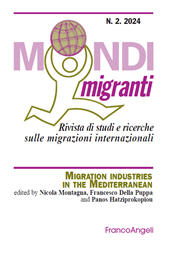Unpacking policy effects on the smuggling industry : a postfunctionalist examination
61-84 p.
Evidence from different countries show that increasingly restrictive policies such as the criminalisation of migrant smuggling and the externalisation of border controls to countries of origin and transit of migratory flows, often result in more sophisticated organisational structures, causing the replacement of small scale decentralised organisations with larger hierarchical structures. Drawing on qualitative interviews with 20 professionals involved in undocumented migration, this study aims to assess the impacts of bilateral policy changes between 2016 and 2021 on the smuggling industry in the Mediterranean through a postfunctionalist theoretical perspective. The Italy-Libya Memorandum of Understanding and the EU-Turkey agreement prompted changes in migrants' routes arriving in Greece and Italy, leading to a shift in demand for smuggling services from certain countries to others.
As the findings suggest, the Italy-Libya agreement increased the demand for smugglers operating in Tunisia, while the EU-Turkey agreement reinforced traditional methods of unauthorised movement relying on smuggling networks. [Publisher's Text].
Le evidenze provenienti da diversi Paesi mostrano che politiche sempre più restrittive, come la criminalizzazione del traffico delle persone migranti e l'esternalizzazione dei controlli alle frontiere nei Paesi di origine e di transito, spesso danno luogo a strutture organizzative più sofisticate, causando la sosti-tuzione di organizzazioni decentrate su piccola scala con strutture gerarchiche più ampie. Basandosi su interviste qualitative a 22 professionisti che a vario titolo operano in relazione alla migrazione irregolare, questo studio si propone di valutare gli impatti dei cambiamenti delle politiche bilaterali tra il 2016 e il 2021 sull'industria del traffico delle persone migranti nel Mediterraneo attraverso una prospettiva teorica postfunzionalista.
Il Memorandum d'intesa Italia-Libia e l'accordo UE-Turchia hanno provocato cambiamenti nelle rotte dei migranti che arrivano in Grecia e in Italia, portando a uno spostamento della domanda di servizi di facilitazione della migrazione irregolare da alcuni Paesi ad altri. Come suggeriscono i risultati, l'accordo Italia-Libia ha aumentato la domanda di trafficanti che operano in Tunisia, mentre l'accordo UE-Turchia ha rafforzato i metodi tradizionali di movimento non autorizzato che si affidano alle reti del traffico. [Publisher's Text].
Forma parte de
Mondi migranti : 2, 2024-
Artículos del mismo número (disponibles individualmente)
-
Información
Código DOI: 10.3280/MM2024-002003
ISSN: 1972-4896
KEYWORDS
- conseguenze involontarie delle politiche migratorie, industria migratoria, reti di contrabbando, migrazione non autorizzata, postfunzionalismo
- unintended consequences of migration policies, migration industry, smuggling networks, unauthorised migration, postfunctionalism


